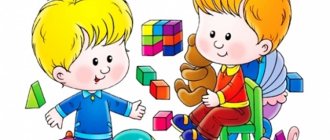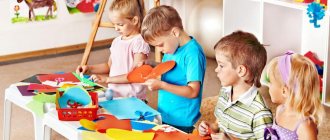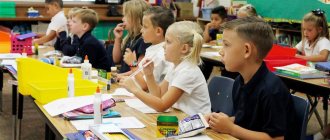With the help of the process of social and communicative development, it is easier for a child to take his place in society, becoming its full member. This process uses many universal means specific to different societies, ages and social strata. This may include:
- formation of hygienic and household skills;
- style and topic of communication;
- elements of spiritual and material culture;
- introducing the baby to different types of relationships characteristic of the main types of life activity (cognition, play, communication, any type of activity).
Every child has to discover the world for himself, so his curiosity, especially in early childhood, knows no bounds. But as he grows up, and also under the influence of various factors (family, kindergarten, environment), he either retains his childish spontaneity, continuing to explore the world and easily make contact, or loses the ability to build even the simplest relationships with peers, that is, communicative communication.
Problems for modern children
A similar problem is increasingly manifested in the modern world, where already a 2-3-year-old child prefers computer games to communication, and watching TV to group games. Thanks to this, he is deprived of the opportunity to develop communication skills, and this, in turn, not only causes a lack of communication itself, but also great difficulties in the process of socialization. As a result, a situation arises in which a child leaving for school is simply unable to communicate with peers - they seem strangers to him, he does not know how to play with them, and does not know what to talk about. If someone offends such a child, he withdraws even more and moves away. In real life, teachers have no time to understand the details of such a conflict, so they make a superficial conclusion - since this child is not able to communicate and make friends, then he is ill-mannered and bad. Analyzing the modern social development of preschool children, we can notice some typical features.
- No matter how the family, society and the world change, preschoolers remain children who love to play, although the content of these games has changed: computer games, modern construction sets and puzzles have been added to role-playing games.
- In the intellectual sphere, children have undergone significant changes - with their curiosity, they have become more informed, they can cope with modern technology very quickly, and they navigate more easily even in adult life thanks to the information saturation at home and in kindergarten.
- There are changes in the social, personal and moral development of children, their communication and behavior.
The problem is actually not that there is something wrong with the child, but that he was not shown, he was not taught how to properly build relationships with peers and how to communicate with them. Since the child does not know how to do this, he avoids everyone, and sometimes he himself causes conflict. Such incidents at such an early age inevitably leave an imprint on the child’s psyche and the formation of his personality. Such a child has little chance of growing up to be a sociable, cheerful, self-confident person, which is a direct path to problems in his personal life and work life. Therefore, it is necessary to understand what children’s social and communicative development is, how to prepare for it correctly and equip the child with the necessary communication skills.
What is socio-communicative development?
The social and communicative development of a child means the complex process of learning to establish and maintain contacts with other people. It is he who lays down the communicative abilities of the future personality, which is understood as the entire set of knowledge, abilities and skills with the help of which a person can adequately perceive and react in the process of communication to the surrounding reality. Simply put, a child needs social and communicative development so that later, when entering school, university and work, he does not experience problems communicating with members of different groups and turns into a full-fledged social unit. There is no doubt about the complexity and length of the process of acquiring communicative competence, so it should begin from early childhood.
Tasks and goals of social and communicative development of preschool children
The process of socialization of a preschooler is multifaceted, since it is influenced by a wide variety of factors:
- heredity;
- the environment surrounding the child;
- the atmosphere in which education takes place;
- games;
- own activities;
- self-development and self-knowledge.
The main goal of the social and communicative development of preschool children is their timely and painless socialization through familiarization with the norms of communication accepted in a given society, with general cultural traditions accepted both in the family and in the country as a whole, in building relationships between peers and older generations. According to the Federal State Educational Standards, each educational institution must have a special program, the implementation of which allows one to achieve all the set goals for the development of children. The ultimate goal, in this case the socialization of the child, can be successfully achieved if the tasks are set correctly, the most important of which are the following:
- comprehension of the main values and moral norms accepted in society;
- developing the child’s ability to make decisions and independence;
- helping the child learn the basic rules of communication with peers and older generations;
- teach the child to show such emotional components of communication as mercy, responsiveness, empathy;
- instilling in children respect for their own family, peers, elders and society as a whole;
- help children develop positive attitudes regarding creativity and work;
- instilling in children a willingness to work and relax together;
- instilling in preschoolers the basics of behavior that is safe for their own lives, as well as the lives of people around them, anywhere (at home, in nature, in society).
If these tasks can be solved, then we can hope to achieve the main goal of the social and communicative development of children of all preschool ages. Then the transition to a qualitatively new school environment will become possible, since the child will be sufficiently prepared and will not encounter any particular difficulties or insoluble problems.
Responsible parents are the key to a child’s successful development!
That is why the timely assistance of preschool education workers is of fundamental importance - you need to send your children to special institutions on time and actively support their socialization.
The fact is that this process directly depends on the influence of parents, whom the child trusts absolutely. It is the influence of parents that is primary in relation to the social development of their child. Research and statistics show that if the mother and father are responsible and competent, then the preschooler himself is much more actively involved in social life and interaction with people.
Communication with a child in the family is the basis of social and communicative adaptation in society
Also, and vice versa: a low level of speech development arises primarily due to insufficient communication in the family, the so-called “personal experience”. This affects the intellectual and creative development of preschool children.
Thus, it becomes clear that the work of parents and educators in institutions is of equal importance for the social and communicative development of children. Moreover, these two points are closely interrelated with each other.
Successful results in the development of social and communication skills in preschoolers lay the foundation for unlocking creative potential, finding their place in the world and building success in life.
leave a comment
Play is the best method of social and communicative development of children
At one time, the innovator and teacher V.A. Sukhomlinsky noted that through play and fairy tales, the unique creativity of a child lies the shortest path to his heart. For parents and educators, it is the game that can become a faithful assistant in the process of children's social and communicative development. Not only for children, but also for much older children, play continues to be the main activity, and communication during play becomes an integral component of it. Psychologist L.S. Rubinstein also assigned a significant role to play activity and noted its importance in the life of a child. He said that only in the process of play does a child not only imitate someone’s personality and play someone else’s role, but at the same time enrich, deepen, and expand his own. As a result, he understands the world around him more easily and understands the events taking place in it. But games are different: usually those that are interesting to the smallest children no longer attract 4-5 year olds. Play activities must be appropriate for children’s age, and the child must feel that he can control events in the game. Only then will he not only understand the importance and meaning of relationships between people, but also determine his place in them, which will help the formation of experience and communication skills necessary not only at this stage of development, but also in the future.
Games for the little ones
For children 2-3 years of age, ordinary role-playing games on classic themes (“daughters and mothers,” “playing a doctor,” “playing a store”) are useful. But it is very important that one of the adults (parents, grandmothers, teacher) takes part in the game, because it is the adults who, by their example, must show the child how to properly conduct a conversation, greet each other, achieve what he wants or refuse something.
"Emotion"
For middle-aged children, the game “Emotion” should seem interesting. In it, the child gains valuable experience in expressing emotions, and also learns to correctly recognize them in other children and respond accordingly. The child can be asked to depict his own emotions, after which other participants in the game, who can be not only children, but also adults, must guess what feeling he depicted.
"Situation"
The game “Situation” will be interesting for older preschoolers. An adult participant invites the child to simulate some situation. For example, a child came to the garden with a dozen apricots, the question is what will he do with them: will he share with friends, eat it himself, or give it to the teacher? It is important that the child explains and motivates his own actions out loud. Another option - let's say a child wins a competition, but his friend loses and is very upset. What should the winner do? With the help of such games, children not only gain excellent communication experience, developing their social and communication skills, but also acquire communicative competence for the future. In addition, they are preparing for painless socialization, when the child will have to independently, without the help of adults, react to events, make decisions and participate in these events.
Development of social and communication skills in children of senior preschool age. article on the topic
Development of social and communication skills in children of senior preschool age.
Prepared by: Elena Viktorovna Malgina, teacher of GBDOU kindergarten No. 23, Moskovsky district, St. Petersburg.
“A child by nature is an inquisitive explorer, a discoverer of the world
So let a wonderful world open before him in living colors, bright and vibrant sounds, in a fairy tale, in a game, in his own creativity, in beauty. Through a fairy tale, a game, through unique children’s creativity - the right path to a child’s heart.” V.A. Sukhomlinsky.
So, the preschool period of the child’s development is coming to an end. Parents are concerned about issues such as:
-Is their child ready for school, have they bought everything.
-whether he can cope with the training program.
-whether the team will accept him.
But we forget that one of the main aspects of readiness for systematic learning is social and communication skills.
Sociability, the ability to communicate with other people is a necessary component of a person’s self-realization, his success in various types of activities, the disposition and love of people around him. The formation of this ability is an important condition for the normal psychological development of a child, as well as one of the main tasks of preparing him for later life.
Many preschoolers experience serious difficulties in communicating with others, especially with peers. Some children do not know how to address another person on their own initiative; sometimes they are even embarrassed to respond appropriately if someone addresses them. They cannot maintain and develop established contact, adequately express their sympathy and empathy, and therefore often conflict or become isolated.
Sociability is one of the components of social and communicative development. Which is aimed at mastering the norms and values accepted in society, including moral and moral values;
In addition, it is aimed at developing the child’s communication and interaction with adults and peers, establishing independence, purposefulness and self-regulation of one’s own actions. Also on the development of social and emotional intelligence, emotional responsiveness, empathy, the formation of readiness for joint activities with peers, the formation of a respectful attitude and a sense of belonging to one’s family and to the community of children and adults. Formation of positive attitudes towards various types of work and creativity. And of course, to form the foundations of safe behavior in everyday life, society, and nature.
It is also necessary to remember one more component – socialization.
It is an important condition for the harmonious development of a child.
A child’s mastery of culture and universal human experience is impossible without interaction and communication with other people. After all, it is through communication that the very development of consciousness and higher mental functions occurs. And a child’s ability to communicate positively allows him to live comfortably among people. Thanks to communication, he not only gets to know another person, be it an adult or a peer, but also gets to know himself more and more. Communication abilities play a leading role in the social development of older preschoolers. It is they that allow you to distinguish between certain communication situations, understand the state of other people in these situations and, on the basis of this, adequately and correctly structure your behavior.
So what is included in the development of communication skills?
Of course, communication and communication.
Communication
– a complex multifaceted process of establishing and developing contacts between people, generated by the needs of joint activities and including the exchange of information, the development of a unified interaction strategy, perception and understanding of another person
Communication
(English communikate – report, transmit) assumes:
-transferring the content of the socio-historical experience of humanity.
-exchange of thoughts and experiences about the internal and external world.
-encouragement and persuasion of interlocutors to act in a certain way.
- to achieve results.
- transfer of experience in various types of activities and ensuring their development.
Communication is communication with the aim of conveying certain information in such a way that the interlocutor understands its meaning.
According to S. V. Borisnev, communication should be understood as a socially determined process of transmitting and perceiving information in conditions of interpersonal and mass communication through various channels using various communication means.
Communication is the exchange of messages, feelings and light, shallow interaction between people.
Unlike communication, communication presupposes the presence of a goal for at least one of the participants.
Main components of communication:
-communicative side of communication (exchange of information between people);
-interactive side (organization of interaction between individuals);
-perceptual side (the process of communication partners perceiving each other and establishing mutual understanding).
In the communication process there are usually
Verbal communication is communication that is carried out through speech.
Nonverbal communication:
This process acquires the necessary skills and abilities. Ease of establishing contact, maintaining a conversation, the ability to listen and express your point of view, argue and defend your position, the ability to come to a compromise solution.
In addition, active listening is the ability to listen carefully to a partner and understand his point of view.
Empathy is an adequate understanding of what is happening in the inner world of another person.
Confrontation is the action of one person aimed at inducing another person to recognize, analyze or change his decision or behavior.
Agree, this is precisely what helps the preschooler in his future adaptation to the classroom.
A child at this age has communication skills represented by words denoting relationships between people, rules of behavior in society, and his figurative speech is formed.
The communication skills of preschool children improve by the time they enter school; the child has already mastered speech etiquette and can maintain a conversation on any topic, within the limits of his understanding, logically and consistently in dialogue and monologue. He knows how to speculate on events and speaks contextually. It should be remembered that the results of preschoolers’ communication skills depend on the professionalism and desire of adults and make it possible to easily master the school curriculum and become successful people in adulthood.
The social and communicative development of preschool children occurs through play as a leading children's activity. Communication is an important element of any game. At this moment, the social, emotional and mental development of the child occurs. Play gives children the opportunity to recreate the adult world and participate in an imaginary social life. Children learn to resolve conflicts, express emotions and interact appropriately with others.
The older the child, the more complete his observations of the world around him, the richer his play. The famous psychologist L. S. Rubinstein said that in the process of play, a child not only transforms into someone else’s personality, but, entering the role, expands, enriches, and deepens his own. By managing children's play, you can influence their relationships and worldview.
In it, the child learns the meaning of human activity, begins to understand and navigate the reasons for certain people’s actions.
By learning the system of human relations, he begins to realize his place in it.
The game stimulates the development of the child’s cognitive sphere.
By acting out fragments of real adult life, the child discovers new facets of the reality around him. Promotes the development of the child’s voluntary behavior, forms creative imagination, promotes the development of the child’s voluntary memory, attention and thinking.
The game creates real conditions for the development of many skills and abilities necessary for a successful transition to educational activities.
One of the indicators of the full and correct development of a preschooler is the ability to interact with peers and elders.
Communicative games are the simplest and most effective way to develop communication skills in children of this age category.
It is important that older preschoolers are fluent in speech, can easily make contact with people, know how to communicate in various situations, are committed to constructive dialogue, are able to successfully interact with communication partners, etc. It is equally important that they are ready to expand their knowledge by building on previously acquired knowledge. This will help the preschooler more easily adapt to the conditions of school life, and, therefore, be a socially active person who can self-realize.
Application
Games to develop social and communication skills
Acquaintance. Equipment: pictures depicting fairy-tale characters. Description of the game: Using a counting rhyme, a driver is selected who examines the picture without showing it to the children. After this, the driver must describe the image, starting with the words “I want to introduce you to my best friend...” The child who was the first to guess which fairy-tale character is depicted in the picture becomes the driver, and the game resumes.
A story about school.
Goal: to develop the skills to enter into the communication process and navigate partners and communication situations.
This game is easy to organize because it does not require special preparation. However, it is very effective for developing children’s speech skills, their imagination, fantasies, and the ability to quickly navigate partners and unknown communication situations.
Children sit in a circle. The teacher begins the story: “What do you know about school...” and the next child picks it up. The story continues in a circle.
Polite words
Goal: developing respect in communication, the habit of using polite words.
The game is played with a ball in a circle. Children throw a ball to each other, saying polite words. Say only the words of greeting (hello, good afternoon, hello, we are glad to see you, we are glad to meet you); gratitude (thank you, thank you, please be kind); apology (sorry, pardon, sorry, sorry); farewells (goodbye, see you later, good night).
Call a friend
Goal: To develop the ability to enter into the communication process and navigate partners and communication situations.
Game rule: the message must be good, the caller must follow all the rules of the “telephone conversation”.
Children stand in a circle. In the center of the circle is the driver. The driver stands with his eyes closed and his arm outstretched. Children move in a circle saying:
Call me
And tell me what you want.
Maybe a true story, or maybe a fairy tale
You can have a word, you can have two -
Just without a hint
I understood all your words.
To whomever the driver's hand points, he must “call” him and convey the message. The driver can ask clarifying questions.
Let's play school. Story-driven role-playing game.
Situation games
Goal: to develop the ability to enter into a conversation, exchange feelings, experiences, emotionally and meaningfully express your thoughts using facial expressions and pantomime.
Children are asked to role-play a number of situations
1. Two boys quarreled - reconcile them.
2. If you really want to play with the same toy as one of the guys in your group, ask him.
3. You found a weak, tortured kitten on the street - take pity on it.
4. You really offended your friend - try to ask him for forgiveness, make peace with him.
5. You came to a new group - meet the children and tell us about yourself.
6. You have lost your car - go up to the children and ask if they have seen it.
7. You come to the library - ask the librarian for a book you are interested in.
8. The guys are playing an interesting game - ask the guys to accept you. What will you do if they don't want to accept you?
9. Children are playing, one child does not have a toy - share with him.
10. The child is crying - calm him down.
11. If you can’t tie your shoelace, ask a friend to help you.
12. Guests have come to you - introduce them to your parents, show them your room and your toys.
13. You came from a walk hungry - what will you tell your mother or grandmother.
14. The children are having breakfast. Vitya took a piece of bread and rolled it into a ball. Looking around so that no one would notice, he threw it and hit Fedya in the eye. Fedya grabbed his eye and screamed. – What can you say about Vitya’s behavior? How should you handle bread? Can we say that Vitya was joking?






